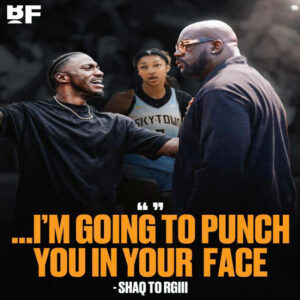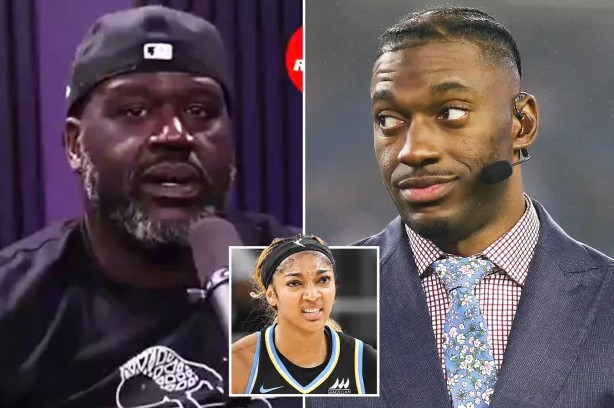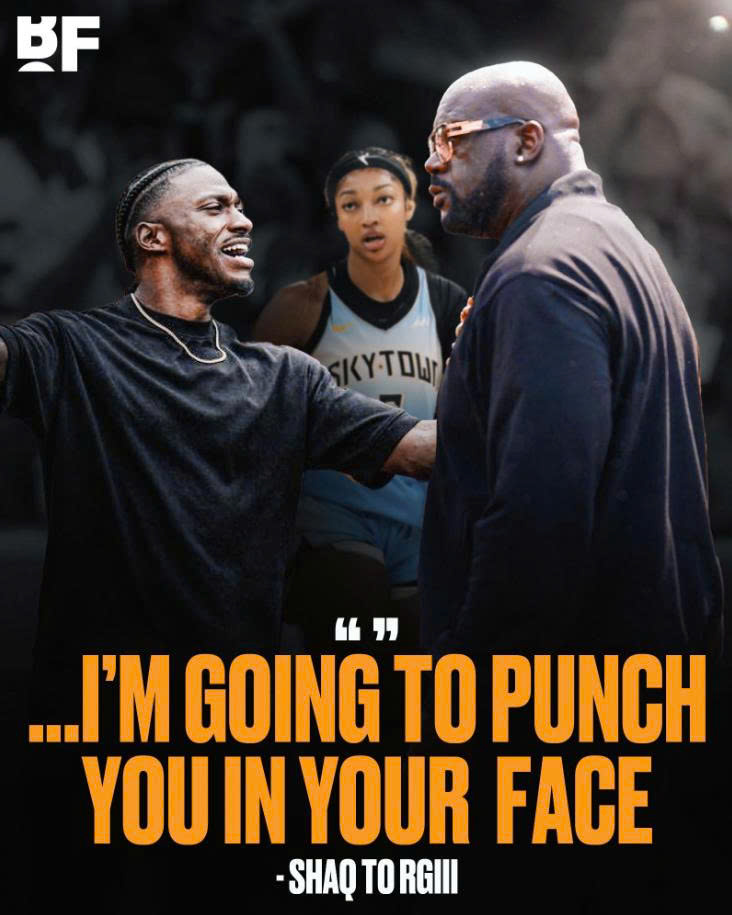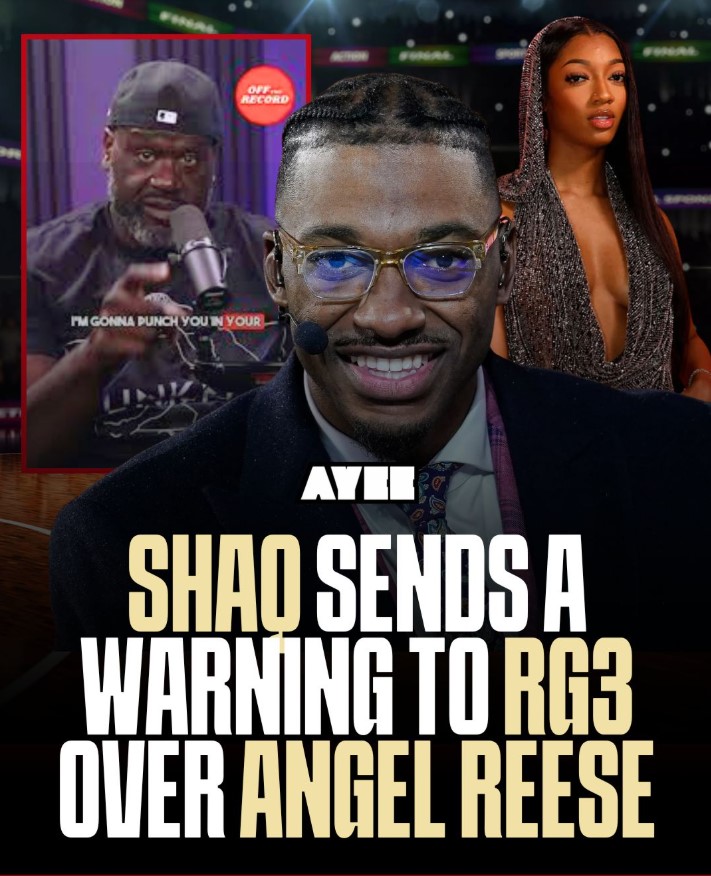Shaquille O’Neal Threatens to Punch Robert Griffin III Over Angel Reese: A Moment of Fury, Loyalty, and Cultural Tension
When Shaquille O’Neal speaks, people listen—but when he threatens to punch someone in the face over a WNBA player, the world watches with jaws on the floor and fingers racing to scroll through every detail of the drama.
In a moment that shocked both sports fans and casual social media users alike, the NBA legend—known for his humor, charisma, and occasional grumpiness—issued an unfiltered, emotionally charged threat toward former NFL quarterback Robert Griffin III, demanding that he immediately stop posting negative or racially insensitive remarks about WNBA star Angel Reese.

O’Neal’s exact words, posted online and instantly circulated across every major platform, were both blunt and explosive: “Tweet another monkey post about my girl Angel Reese and I’m going to punch you in your fcking face… Leave my Angel Reese alone. Fcking stop it. Last time.”
This wasn’t a vague expression of disappointment or a carefully crafted PR response—this was Shaq, raw and unfiltered, drawing a hard, non-negotiable line in the sand to protect someone he clearly sees as more than just a rising basketball talent, but as a young woman who has been repeatedly targeted and vilified online.
To understand the depth and fire of Shaq’s words, you have to look beyond the profanity and dig into the long-standing racialized scrutiny that Black female athletes, particularly outspoken ones like Angel Reese, have had to endure for simply being confident, competitive, and unwilling to conform to quiet, “marketable” stereotypes.

Angel Reese, a two-time WNBA All-Star in just her sophomore season, has become a polarizing figure—not because of any scandal or wrongdoing—but because she plays with swagger, celebrates loudly, and refuses to shrink herself to fit into a mold built by decades of media bias and coded expectations.
The online commentary she receives is often harsh, disproportionate, and frequently tinged with racism, misogyny, and coded language—words like “classless,” “ghetto,” or “monkey,” which have historically been used to diminish, dehumanize, and marginalize Black women who dare to take up space and own their power publicly.
When Robert Griffin III—commonly known as RGIII—tweeted or shared what many interpreted as racially insensitive or mocking commentary about Angel Reese, it wasn’t received in a vacuum; it came at the tail end of a long series of moments where she’s been attacked, often unfairly, while her white counterparts have been praised for similar behaviors.
Shaquille O’Neal, who has consistently championed women’s sports and been an open supporter of Reese, clearly reached a boiling point and used the full weight of his platform—not to politely disagree, but to call out what he saw as a continuation of a harmful pattern that needed to stop, immediately.

While some have questioned the aggressive tone of Shaq’s comments, others see it as a necessary and long-overdue expression of protection—a rare moment where a powerful Black man steps up unapologetically to defend a young Black woman from public ridicule and racially coded attacks.
The incident has ignited widespread debate across sports media, social media, and cultural platforms, raising larger questions about how Black athletes are portrayed differently depending on gender, personality, and performance—and how media narratives can deeply shape public perception in dangerous ways.
In sports, particularly basketball, trash talk and passion are often celebrated—when they come from the “right” players, in the “right” context—but when a woman like Angel Reese shows the same fire, she is often labeled as disrespectful, immature, or worse, revealing the double standards that persist in modern coverage.
Shaq’s defense of Reese wasn’t just about one tweet or one insult—it was about defending dignity, fighting back against systemic disrespect, and making it known that someone is watching, someone cares, and someone is willing to call out the bullshit publicly without hiding behind corporate-speak or media filters.
It’s worth noting that RGIII, who is also Black, now finds himself at the center of criticism from both sides—some accusing him of betraying his own community with tone-deaf remarks, while others argue that Shaq’s violent rhetoric sets a dangerous precedent, even if emotionally justified by years of built-up frustration.
Regardless of where one stands on the tone of Shaq’s words, it’s impossible to deny the power of a man of his stature using his voice, loudly and without apology, to shield a young woman who’s been navigating fame, criticism, and pressure far beyond her years—all while dominating on the basketball court.

Angel Reese, for her part, has not directly commented on the incident—but her continued poise in the face of criticism speaks volumes, and her performance on the court remains her loudest and most eloquent response to anyone questioning her worth, attitude, or place in the game.
The viral moment has sparked renewed conversations around allyship in sports, particularly how male athletes—especially those with enormous platforms like Shaq—can use their influence to defend and elevate women in ways that don’t just offer symbolic support, but also challenge the cultural norms that allow mistreatment to continue.
It’s also a stark reminder of how fragile the space is for young Black women in the public eye, who often have to walk a tightrope between confidence and humility, fire and silence, excellence and likability—conditions not expected of their male or white counterparts nearly as often.
As the discourse continues to evolve, one thing is certain: Shaquille O’Neal’s threat, whether seen as excessive or necessary, has drawn a massive spotlight back onto the treatment of Angel Reese, the media’s role in shaping public narratives, and the urgent need to reassess how we talk about, support, and protect Black women in sports.
Maybe the words could’ve been different. Maybe the delivery was harsh. But maybe, just maybe, this was the jolt the conversation needed to move from polite think-pieces to real accountability—and for once, someone had Angel Reese’s back loud enough for the world to hear.